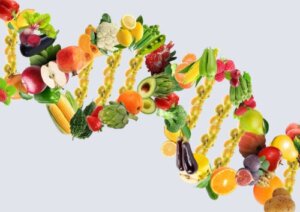How Does Nutrigenomics Help Your Health?


Written and verified by the nutritionist Maria Patricia Pinero Corredor
Technological and medical advances have always gone hand-in-hand. Their purpose is to solve health problems. Nutrigenomics is an example of technological changes at the service of humanity. Scrutinizing our genes to discover how the nutrients we consume can affect us is to completely individualize our diets.
Nutrigenomics thus provides more information on how to choose the best foods or diets for our genome. This branch of science can help prevent diseases, promote weight loss, improve sports performance, and many other things.
Stay tuned to learn more about the breadth of this technology in personalizing your lifestyle and achieving better health.
What is nutrigenomics?
In the 21st century, scientists manabed to obtain information of the complete human genome…and with it, the relationship between our DNA and our health.
As a result of this discovery, other branches of molecular nutrition have emerged, such as nutrigenomics, which focuses on studying the effects of nutrients on the genome, proteins, and the body’s metabolism.
From another perspective, nutrigenomics identifies specific nutrients related to diseases. Thus, strong links have been established between food and genes, as well as lifestyle.
Therefore, this discipline moves in a triad:
- The human genome
- Nutrition
- Health
It represents the foundation of the preventive medicine of the future.
Other concepts that emerged were nutrigenetics and epigenetics. The first refers to how genes can condition nutritional needs. The second refers to how external factors modify gene expression.
The identification of certain genes can predict how each body will respond to certain nutrients. For example, the FTO gene is related to energy expenditure and metabolism, affecting weight control and body composition. Therefore, a nutritionist could help choose the best eating plan to avoid weight gain and obesity.
We think you may also enjoy reading this article: The Nutritional Value of Red Fruit and Vegetables
What is nutrigenomics based on?
Overall, nutrigenomics is based on three principles:
- The nutrients and biochemical compounds we consume through our diet interact with the genome. This relationship can be direct or indirect and regulates gene expression.
- Certain diet-regulated genes play an important role in the origin, incidence, progression, or severity of chronic diseases.
- Genetic variations between individuals can influence the way we metabolize nutrients.

Objectives of nutrigenomics for health
Nutrigenomics is particularly relevant in precision medicine by adapting preventive measures and treatments to the particular characteristics of each person. This branch aims to achieve the following objectives:
- They cause changes in cellular metabolism and metabolic profiles, in order to prevent, mitigate, predict and cure diseases. This is especially true in the case of those in which the nutritional factor is the most important causal element.
- They allow scientists to discover which components of the diet have health benefits.
- In addition, they allow them to understand how our genes interact with the different nutritional elements.
- They help determine the effective doses of nutrients to be consumed.
- They can be used to develop individual dietary recommendations. In this way, nutritional plans would be more efficient.
Although there are many answers, there’s still room for improvement. In addition, there are some complex diseases in which nutrition is only a part of the total factors. This is the case with cardiovascular diseases and obesity, for example.
Applications of nutrigenomics in health
In nutrigenomics, some advances have been made so that nutrition can contribute to the recovery of health. Here, we’ll explain them.
The development of dietary portfolios
One of the most widespread applications of nutrigenomics is the development of dietary portfolios or DP for specific diseases. These portfolios are created with the combination of two or more functional foods that are designed for a specific disease or group of diseases.
The most important thing about DP is that it is based on scientific evidence that confirms the effect of each nutrient on health. So far, several Dps are known to exist for different diseases, although not all of them work properly.
An example is a portfolio developed for metabolic syndrome (obesity, high blood pressure, high blood sugar, high triglycerides, and low HDL cholesterol). The DP for this disease includes four functional foods: soy protein, oats, chia seeds, and dehydrated nopal. Each of these foods has been studied and shown to have an effect on metabolic syndrome, including gene activation and transcription.
It provides evidence on the healthiest diets
So far, there are several studies that demonstrate the effect of the Mediterranean diet on the genome. Thus, this type of diet is commonly recommended for people susceptible or at risk of disease.
In general, the Mediterranean diet pattern is characterized by the following:
- High consumption of vegetables, fruits, whole grains, legumes, and nuts
- The predominance of monounsaturated fats, such as olive oil
- High consumption of fish
- A moderate amounts of poultry and dairy products
- Low consumption of red meat and its derivatives
- Moderate consumption of alcohol, such as red wine
Evidence indicates that the Mediterranean diet style can counteract genetic risk. In particular, the interactions of the diet with the FTO gene for obesity and the MC4R that determine the risk of diabetes. Likewise, their genetic interaction with the risk of hypertriglyceridemia was also established.
Like this article? You may also like to read: The Influence of Food Processing on the Nutritional Value of Foods
It helps to make better nutritional decisions
Nutrigenomics provides information that helps to discern whether or not to consume certain foods. These decisions can improve, recover or prevent some health conditions. For example, if a person is prone to high blood pressure or high cholesterol, then they’ll plan to reduce sodium and saturated fat consumption.
If they have a sweet tooth, a plan can be created to counteract this condition and prevent the development of type 2 diabetes. Likewise, you can find out if a high-protein diet helps with weight loss. If so, a plan is prepared based on this result.
In this way, genetic information will allow a healthier life by modifying external factors related to diet and health.

How are nutrigenomic tests applied?
To obtain genetic information, a simple swab of the inside of the mouth is performed. It’s then sent to the laboratory for analysis and you have to wait a few weeks to get the results on gene variations.
It should be clear that the test results show the potential for a health condition and how the body will respond to certain nutrients. They are probabilities; therefore, they’re not proven facts.
In addition, the results should be guided by a dietitian with training in nutrigenomics. The professional will explain the health effect and the foods or nutrients to be selected.
Is nutrigenomics an efficient tool to improve your health?
Personalized nutrition based on your genetics, predispositions, and preferences may replace general nutritional recommendations in the future. This means that your decision-making will be more reliable. However, it’s also important to remember that the trend is a prognosis and not a guarantee.
A great advance of nutrigenomics is that with it we can know the mechanisms of action of nutrients to prevent or recover from certain diseases. Likewise, the food industry can develop new dietary products with health benefits.
More studies are still needed to determine individual susceptibility to some health disorders and to implement measures to prevent them. The aim is to improve people’s quality of life.
All cited sources were thoroughly reviewed by our team to ensure their quality, reliability, currency, and validity. The bibliography of this article was considered reliable and of academic or scientific accuracy.
- Jhonny Eddison Vargas-Hernández. Nutrigenómica humana: efectos de los alimentos o sus componentes sobre la expresión RNA. Rev. Fac. Med. 2016 Vol. 64 No. 2: 339-49. Disponible en: http://www.scielo.org.co/pdf/rfmun/v64n2/v64n2a19.pdf
- Marti, M. J. Moreno-Aliaga, M. A. Zulet y J. A. Martínez. Avances en nutrición molecular: nutrigenómica y/o nutrigenética. Nutr. Hosp. (2005) XX (3) 157-164. Disponible en: https://scielo.isciii.es/pdf/nh/v20n3/revision.pdf
- Berciano, Silvia & Ordovas, Jose. (2013). Nutrigenómica. Interacciones gen-dieta y sus implicaciones en la práctica clínica. Disponible en: https://www.researchgate.net/publication/277670480_Nutrigenomica_Interacciones_gen-dieta_y_sus_implicaciones_en_la_practica_clinica
- Fall, Tove & Ingelsson, Erik. (2012). Genome-wide association studies of obesity and metabolic syndrome. Molecular and cellular endocrinology. 382. 10.1016/j.mce.2012.08.018.
- Ortega-Azorín C, Sorlí JV, Asensio EM, Coltell O, Martínez-González MÁ, Salas-Salvadó J, et al. Associations of the FTO rs9939609 and the MC4R rs17782313 polymorphisms with type 2 diabetes are modulated by diet, being higher when adherence to the Mediterranean diet pattern is low. Cardiovasc Diabetol 2012;11:137. Disponible en: https://www.ncbi.nlm.nih.gov/pmc/articles/PMC3495759/
- Kathiresan, Sekar & Melander, Olle & Guiducci, Candace & Surti, Aarti & Burtt, Noel & Rieder, Mark & Cooper, Gregory & Roos, Charlotta & Voight, Benjamin & Havulinna, Aki & Wahlstrand, Björn & Hedner, Thomas & Corella, Dolores & Tai, E-Shyong & Ordovas, Jose & Berglund, Göran & Vartiainen, Erkki & Jousilahti, Pekka & Hedblad, Bo & Orho-Melander, Marju. (2008). Six new loci associated with blood low-density lipoprotein cholesterol, high-density lipoprotein cholesterol or triglycerides in humans (vol 40, pg 189, 2008). Nature genetics. 40. 1384. 10.1038/ng1108-1384a.
This text is provided for informational purposes only and does not replace consultation with a professional. If in doubt, consult your specialist.








